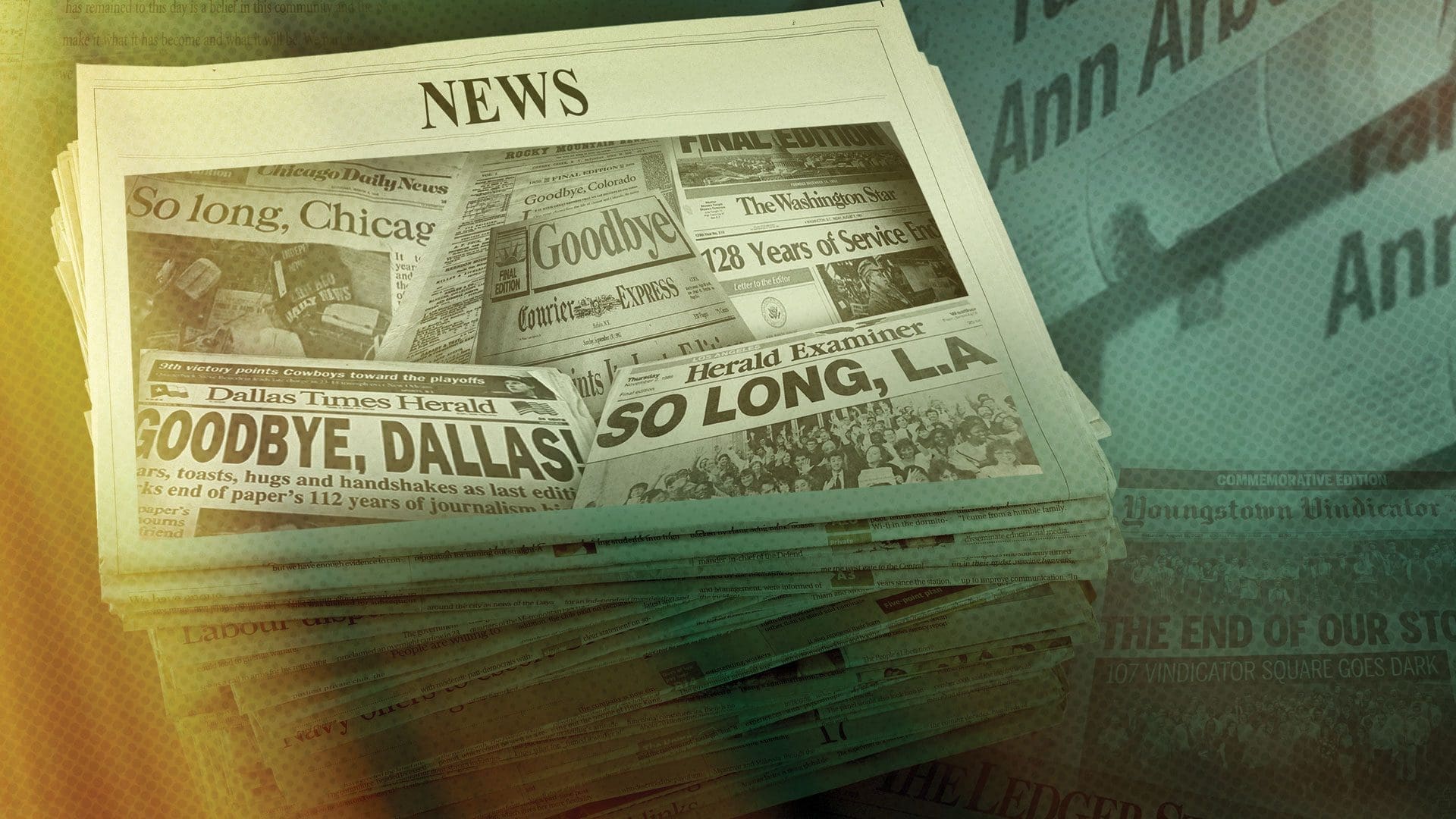Given seismic shifts in the world of journalism—with newspapers shuttering, reporting jobs being slashed, and the rise of sometimes questionable news sources—we asked a handful of our most notable alumni journalists: What do democratic societies have to lose and/or gain from dramatic changes in the profession?

Facing the Digital Era Head-on
Jess Mary Aloe ’09
Former news reporter, Burlington Free Press
About three and a half years ago, the city of Burlington was coming uncomfortably close to a looming deadline. The city had to pick a buyer for its municipal telecom company by the end of 2017, the condition for avoiding a multi-million-dollar lawsuit following significant financial mismanagement.
Would Burlington Telecom go to a local co-op? A public Canadian company? A family-owned Midwestern media empire? The mayor and the city councilors were divided and deadlocked.
It was around midnight when a few councilors ducked into a hallway and rewrote the entire sale agreement during a break. I know because I was there, reporting on the contentious sale for my newspaper.
I don’t know if I or any of my colleagues would be there if the sale happened today. That’s one less set of eyes on what the government is doing, one less curious person noticing suspicious details. But staff hours are valuable, and city government meetings are long.
I was at the Burlington Free Press from January 2016 to August 2019. During that time, I saw several journalists laid off. I also saw many colleagues leave journalism, tired of low pay and stressful workplaces.
I don’t mourn the old way of doing things.”
—Jess Mary Aloe
But I don’t mourn the erosion of the old way of doing things. I think, with a little luck and a lot of work, local news can use this moment to better serve you. We’ve followed the same formula for years. We tell you what city government is doing, what crimes happened nearby.
Now we’re experimenting to figure out how to build a loyal, engaged audience in a digital era. Local news must do journalism that has impact, that offers insight, and that holds the powerful accountable.
That means dismantling the old model, even though it is painful to let journalism traditions go. But that old way of doing things was very far from perfect. We ignored marginalized voices. We were happy to write for only a slice of the population instead of constantly trying to reach more.
If the Burlington Telecom sale were happening today, I might not have been in that hallway for that backroom deal. That’s a loss.
But I still would have been paying attention. Maybe, freed from the need to report every twist and turn because it’s what we’ve always done, I would have found bigger stories, impactful stories. More important stories.

Chasing the Clickbait
Jake Meth ’10
Associate editor, Fortune Magazine
Journalists, if they’re doing their jobs right, hold the powerful accountable and keep people informed about issues relevant to their lives. Citizens of democracies depend on this reporting to help decide who should represent them in government.
But this arrangement is breaking down. Under financial pressures, journalism is shifting away from deeply sourced investigative reporting and toward aggregation and clickbait—and democratic societies are suffering as a result.
I’ve seen this process play out in my own workplace. I began working at Fortune only three years ago, and since then the magazine has been sold twice, and seen layoffs of veteran journalists and an emphasis on chasing web clicks.
With so many experienced editors and reporters leaving our staff, younger journalists like myself were deprived of an opportunity to learn from them. Uncertainty around our ownership status led many other talented journalists to leave, and those who remained were constantly wondering what would happen next. On top of that, as the stock price of our former owner, the now-defunct Time Inc., faltered, we were burdened with frequently shifting, frantic directives to hit web traffic targets. Management desperately sought to recapture ad dollars that were once the province of print magazines but now almost exclusively flow to tech giants like Google and Facebook.
Citizens of democracies depend on this reporting.”
—Jake Meth
Undoubtedly, these setbacks and distractions diminished the quality of the digital journalism we produced. Only over the last half-year, with the sense of stability that’s come from breaking away as an independent company, has Fortune’s website begun producing more of the essential reporting its print magazine has long been known for.
As with all professionals, journalists need stability and a path to internal progression in order to thrive at work. Recently we’ve taken significant steps in that direction. Our digital staff unionized, and we are now pursuing a contract that will offer greater job protections and defined paths for growing within the company. And our new management is focused on expanding the reach and influence of our respected brand.
Other outlets haven’t been as lucky, and the more that they either shut down, retrench, or rely on tricks to draw in readers, the more society will lose faith in the media.

The Media Are Complacent While the World Burns
Mark Hertsgaard ’77
(Written with Kyle Pope)
Environmental correspondent for The Nation and author of books including Earth Odyssey and HOT, Hertsgaard has reported on climate change for 30 years from 25 countries and the U.S. Kyle Pope is the editor and publisher of The Columbia Journalism Review.
At a time when civilization is accelerating toward disaster, climate silence continues to reign across the bulk of the news media. Especially on television, where most Americans still get their news, the brutal demands of ratings and money work against adequate coverage of the biggest story of our time. Many newspapers, too, are failing the climate test. In October 2018, the scientists of the United Nations’ Intergovernmental Panel on Climate Change (IPCC) released a landmark report, warning that humanity had a mere 12 years to radically slash greenhouse gas emissions or face a future in which hundreds of millions of people worldwide would go hungry or homeless or worse. Only 22 of the 50 biggest U.S. newspapers covered that report.
Instead of sleepwalking us toward disaster, journalists need to remember our Paul Revere responsibilities—to awaken, inform, and rouse the people. To that end, The Nation and the Columbia Journalism Review have announced Covering Climate Now, a project aimed at dramatically improving how the media as a whole covers the climate crisis. When the IPCC scientists issued their 12-year warning, they said that limiting temperature rise to 1.5 degrees Celsius would require radically transforming energy, agriculture, and other core sectors of the global economy. Our project is grounded in the conviction that the news sector must transform just as radically.
The project was launched April 30 at a conference at the Columbia School of Journalism in New York, where journalists gathered to start charting a new course. That event was the beginning of a conversation that America’s journalists and news organizations must have with one another, and with the public we serve, about how to cover this rapidly uncoiling emergency.
Climate silence continues to reign across the bulk of the news media.”
—Mark Hertsgaard
Judging by the coverage to date, most news media still don’t get it: There is a runaway train racing toward us, and its name is climate change. That is not alarmism; it is scientific fact. We as a civilization urgently need to slow that train down and help as many people off the tracks as possible. It’s an enormous challenge, and if we don’t get it right, nothing else will matter. The U.S. mainstream media, unlike major news outlets in Europe, have played a big part in getting it wrong for many years. It’s past time to make amends.
As the nation’s founders envisioned, the role of a free press is to inform the people and hold the powerful accountable. These days, our collective survival demands nothing less.
Reprinted with permission from The Nation and The Columbia Journalism Review.

Keeping Score
Joanne Silberner ’77
Global health news editor for British Medical Journal and independent journalist; former health policy correspondent, National Public Radio
I graduated from Hopkins in 1977 with a bachelor’s in biology and got a master’s degree from the Columbia University Graduate School of Journalism in 1979. At grad school, I was imbued with all the values of the day. Among them: Better to be right than to be first. Stay above the fray, and don’t take anything personally. Report and write well, and you’ll have one of the best jobs on the planet.
Gone, gone, and gone—sometimes for the good of our democratic society, but more often for the bad.
Better to be right than first? When I started as a health policy correspondent at NPR in 1992, there was no web. When I covered a hearing on Capitol Hill or the Food and Drug Administration, my goal was to leave the hearing by 2 or 3 p.m. so I’d have several hours to pull together a story for that night, or the next morning.
By the time I left NPR in 2010, I was expected to be writing a version for immediate posting on the web on the way back to the office, leaving me little time to think through what I’d heard, or bring anything extra to it. The immediate turnaround is fun and intense, but meaning suffers. Many media outlets today have gone to a “web-first” approach. Scorecard: minus one for listeners/readers/viewers.
The immediate turnaround is fun and intense, but meaning suffers.”
—Joanne Silberner
Stay above the fray, and don’t enter the arena? OK, I was never actually taught that, it’s just what was done. Back then, the head of the country was not disparaging individual journalists or media outlets, or calling them liars. On this point I can talk only as a media consumer; I’ve not covered this Administration. It seems to me that journalists were at first a bit stunned, and then (as a generalization, of course) they took action. The harsh and inaccurate words of President Trump energized journalists to go out and do some terrific and courageous reporting and truth-squadding. Scorecard: plus one for journalism. The situation itself, though, is a minus one for our democracy, both because the level of discourse is so corrosive, and because the President’s foibles crowd out other stories that also need telling.
Work hard and well, and your job will take you through to retirement. Oy. According to the Pew Research Center, newsroom employment (reporters, editors, photographers, videographers) dropped 25 percent from 2008 to 2018; at newspapers, the toll was 47 percent. That followed previous precipitous drops as media outlets lost advertising to the web and had to cut staff. Fewer national journalists, fewer local journalists. There is nothing good here for the functioning of a democratic society, which relies on a well-informed public.

Is There an Upside?
Christopher Bonanos ’90
City editor, New York Magazine
What do we have to lose? Those democratic societies themselves. The great strength of the messy old media economy lay in its redundancy. In the 1940s, New York City (to take the example that I know best) had nine general-interest daily newspapers. On top of that, it had specialty outlets like The Wall Street Journal (for business readers) and the Daily Worker (for Communists) and the Amsterdam News (for African Americans), plus dozens of foreign-language dailies that went to hundreds of thousands of readers.
With so many outlets jostling for competitive advantage, in competition for scoops and also for talented staff, it was not so easy for large-scale bad civic behavior to slip by. That became even truer in the generation that followed, as the papers became professionalized and wealthy, and the top tier of reporters (inspired by Woodward and Bernstein, among others) dug in hard against the power structure. With the thinning of the ranks—New York now has one big paper that has refocused its Metro desk away from small local news, and two other papers that are hanging on for dear life—the coverage of civic institutions can become facile and focused on today’s reaction shot rather than on the long-term slow digging that might, infrequently, deliver a knockout punch.
It’s much worse in other cities. New York will, at least, have the New York Times indefinitely. Small towns will have their feisty three-person newsrooms that cover municipal meetings. It’s the in-between cities, where readers can get most of their news from a national newspaper like the Times plus some local TV, that are in deep trouble. Most of them are down to one newspaper, and many of those that aren’t will soon be down to one.
The death spiral of a lot of old media has led to the flowering of new-media companies that use data as both source and inspiration.”
—Christopher Bonanos
So is there an upside? Maybe. The death spiral of a lot of old media has led to the flowering of new-media companies that use data as both source and inspiration. Buzzfeed figured out what people will click on, to a sometimes terrifying degree, and monetized it; then the company used that platform to expand from silly listicles into pretty good journalism. FiveThirtyEight crunches polling data in interesting ways. Other newish startups like The Trace and The Marshall Project have been established as nonprofits and have done great work. Further ideas will come along after those. But so far they’re all either dependent on ads, which are disappearing, or on largesse from foundations or donors to keep going. When all these institutions’ economic strength is based on habit and whim—well, that’s a pretty thin peg on which to hang the survival of the republic.




